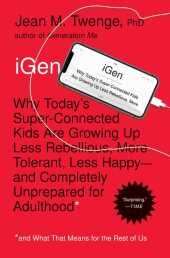 Neuerscheinungen 2018Stand: 2020-02-01 |
Schnellsuche
ISBN/Stichwort/Autor
|
Herderstraße 10
10625 Berlin
Tel.: 030 315 714 16
Fax 030 315 714 14
info@buchspektrum.de |

Jean M. Twenge
iGen
Why Today´s Super-Connected Kids Are Growing Up Less Rebellious, More Tolerant, Less Happy--and Completely Unprepared for Adulthood--and What That Means for the Rest of Us
2018. 352 S. charts and graphs throughout. 212.72 mm
Verlag/Jahr: SIMON & SCHUSTER US; ATRIA BOOKS 2018
ISBN: 1-501-15201-7 (1501152017)
Neue ISBN: 978-1-501-15201-6 (9781501152016)
Preis und Lieferzeit: Bitte klicken
Named one of the "Best Tech Books of 2017" by Wired Magazine
iGen Introduction
Who Is iGen, and How Do We Know?
When I reach 13-year-old Athena around noon on a summer day, she sounds as if she just woke up. We chat a little about her favorite songs and TV shows, and I ask her what she likes to do with her friends. "We go to the mall," she says. "Do your parents drop you off?" I ask, remembering my own middle school days in the 1980s when I´d enjoy a few parent-free hours with my friends. "No-I go with my family," she says. "We´ll go with my mom and brothers and walk a little behind them. I just have to tell my mom where we´re going. I have to check in every hour or every thirty minutes."
Hanging out at the mall with your mom around isn´t the only difference in teens´ social lives these days. Athena and her friends at her middle school in Houston, Texas, communicate using their phones more than they see each other in person. Their favorite medium is Snapchat, a smartphone app that allows users to send pictures that quickly disappear. They particularly like Snapchat´s "dog filter," which inserts a cartoonish dog nose and ears on people´s heads as they snap photos. "It´s awesome-it´s the cutest filter ever," she says. They make sure they keep up their Snapstreaks, which show how many days in a row they have Snapchatted with each other. Sometimes they screenshot particularly ridiculous pictures of friends so they can keep them-"it´s good blackmail."
Athena says she spent most of the summer hanging out by herself in her room with her phone. "I would rather be on my phone in my room watching Netflix than spending time with my family. That´s what I´ve been doing most of the summer. I´ve been on my phone more than I´ve been with actual people." That´s just the way her generation is, she says. "We didn´t have a choice to know any life without iPads or iPhones. I think we like our phones more than we like actual people."
iGen has arrived.
Born in 1995 and later, they grew up with cell phones, had an Instagram page before they started high school, and do not remember a time before the Internet.
The oldest members of iGen were early adolescents when the iPhone was introduced in 2007 and high school students when the iPad entered the scene in 2010. The i in the names of these devices stands for Internet, and the Internet was commercialized in 1995. If this generation is going to be named after anything, the iPhone just might be it: according to a fall 2015 marketing survey, two out of three US teens owned an iPhone, about as complete a market saturation as possible for a product. "You have to have an iPhone," said a 17-year-old interviewed in the social media exposé American Girls. "It´s like Apple has a monopoly on adolescence."
The complete dominance of the smartphone among teens has had ripple effects across every area of iGen´ers´ lives, from their social interactions to their mental health. They are the first generation for whom Internet access has been constantly available, right there in their hands. Even if their smartphone is a Samsung and their tablet is a Kindle, these young people are all iGen´ers. (And yes, even if they are lower income: teens from disadvantaged backgrounds now spend just as much time online as those with more resources-another effect of smartphones.) The average teen checks her phone more than eighty times a day.
But technology is not the only change shaping this generation. The i in iGen represents the individualism its members take for granted, a broad trend that grounds their bedrock sense of equality as well as their rejection of traditional social rules. It also captures the income inequality that is creating a deep insecurity among iGen´ers, who worry about doing


